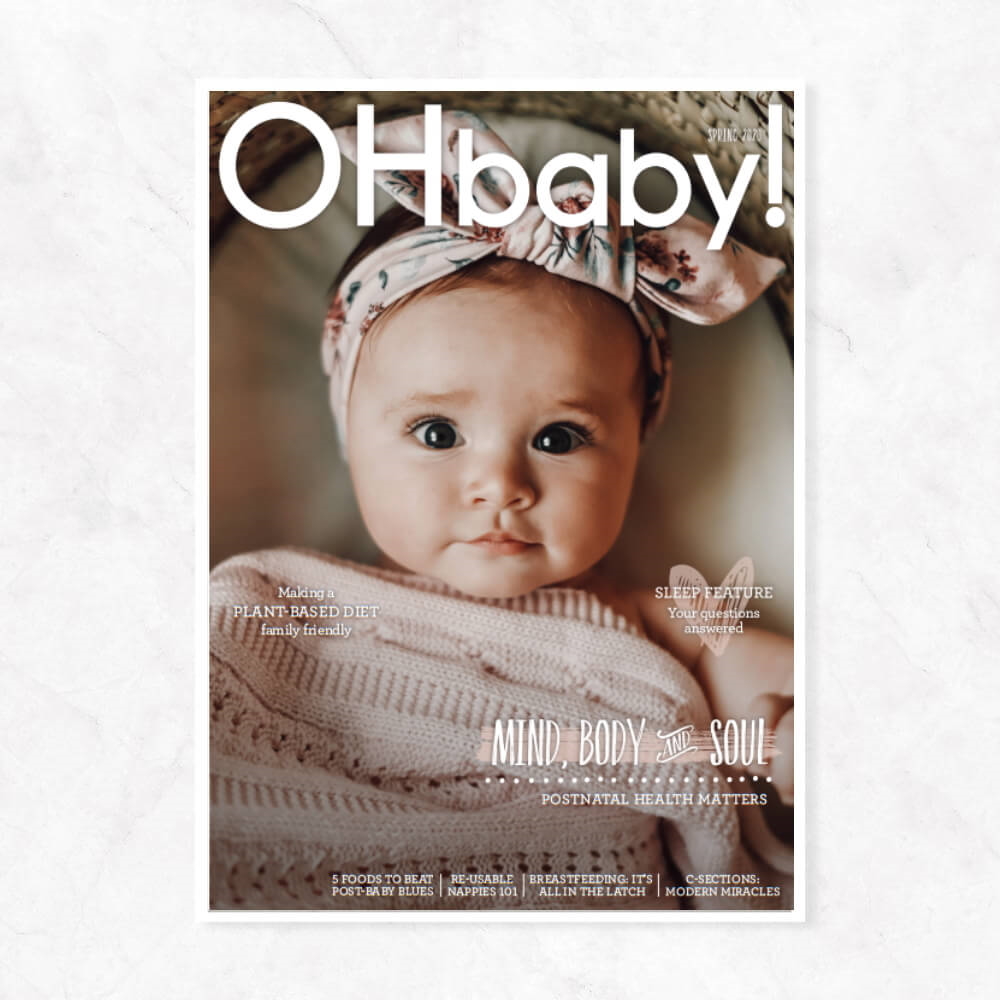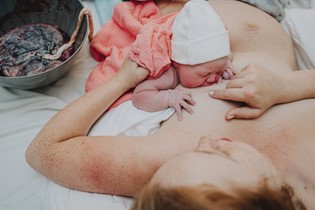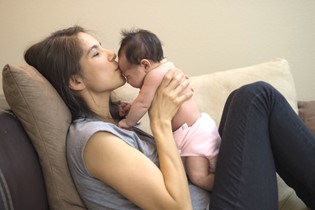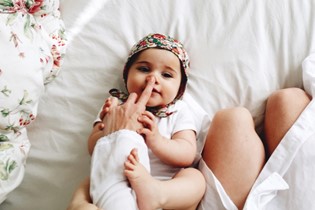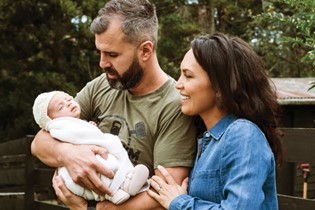Postnatal depression: the road to recovery

A mother’s mind and emotions are stretched just as much as her body during pregnancy and birth. Chantal Hofstee unpacks postnatal depression and anxiety, and gives guidance on the road to recovery.
Growing a human being, then giving birth to and nursing that tiny human, is one of the most bizarre but beautiful experiences a woman can go through. During those experiences there’s a sense of being stretched – physically, mentally and emotionally. While the physical ‘stretching’ is the most obvious, the mental and emotional stretching is often overlooked when women are recovering from birth, but it is just as important as their physical recovery.
The stretch
As the little bundle of cells grows from the size of a poppy seed to the size of a watermelon, your body also grows and stretches to accommodate your baby. Your body also provides all the nutrients and energy to enable this miraculous process to happen, all the while still living your life (somewhat) normally. Sometimes pregnancy is a graceful process filled with awe and happiness, and sometimes it’s a gruelling experience filled with sickness and anxiety. Both of these extremes, and everything in between, have one thing in common and that is change. You will experience changes in your hormones, your moods, your energy levels, your body shape, your appetite... and so much more!
Chemical changes
The physical changes are obvious as your body turns into a human incubator and literally stretches itself to the max. The mental and emotional stretching that happens during this process is less obvious, but no less real. As I’ve mentioned, growing a ‘Mini Me’ can be a joyous, grace-filled experience, but for many women it may come with various levels of anxiety, sadness and anger. Just as our bodies change, so do our emotions.
At a chemical level, this can be attributed to the change in hormones which directly influence our thoughts and feelings. From a psychological perspective, this can be attributed to many reasons, such as:
▪️ Fear of what the world might be like when this baby is an adult.
▪️ Fear of not being a good parent.
▪️ Fear for the health of the child.
▪️ Fear of not feeling enough love for the child.
▪️ Sadness over missing loved ones who have passed away.
▪️ Sadness over a lack of nurturing and love in one’s own childhood.
▪️ Sadness over changing relationships.
▪️ Anger over feeling overburdened.
▪️ Anger over feeling unsupported by family and friends.
▪️ Anger over feeling neglected by a partner.
Note the similarities these examples all share. They’re all driving you to increase your ability to give your baby the best chance of survival. It’s your brain saying, ‘Fix the world for your baby, become a super parent – and fix that partner of yours to make sure they will stick around and provide security and safety!’ It isn’t always the most helpful thing for your brain to do, but the underlying aim is to ensure your offspring’s survival.
The birth
If you think growing something to the size of a watermelon is pretty extreme, how extreme is it to then have to push that watermelon out of you?! Birth can come with intense highs and lows – usually a combination of the two. (I’m quite certain you’ll never hear anyone say that their experience giving birth was boring!)
I’ve given birth three times; for me each was a profound experience. Your body is taken over by instinctive urges, by exhaustion and by pain. Your mind works on a different level and your emotions are raw and heightened. I remember the feelings of surprise on seeing my new baby’s face (So this is what you look like!), deep love (with each baby I thought, I’ve never felt this kind of love!), joy (We did it!), fear (Are you okay, baby?), relief (It’s over now) and protectiveness (You’re so vulnerable – how will I keep you safe?). There was also a strange emptiness, especially after the most challenging of my three birth experiences.
We don’t ‘bounce back’ from birth – we heal
Just like it’s unrealistic and potentially damaging to think we can physically just ‘bounce back’ from pregnancy and giving birth, the same goes for thinking we can just ‘bounce back’ mentally and emotionally. Our minds heal by nurturing ourselves, and by processing the emotions by talking with our closest loved ones and dealing with our emotions in a mindful way before we create the narrative for the outside world.
In my grandmother’s time, this process wasn’t rushed. After giving birth, new mothers were ordered to stay in bed for 10 days, and to stay inside for 14 days. Everyone should do what they feel is best for their family but in my view, many women are at risk of saying ‘Yes’ to visitors and activities too soon. Nowadays it’s normal to have visitors arriving the very next day, bringing gifts, taking pictures, asking you how it was. It might be fun for them – but it might be too soon for the new mother.
Perhaps this rush to ‘bounce back’ is why midwives all over the world report that new mothers recovered so much better during lockdown. Their milk came in faster, their babies returned to their birth weight sooner and there were less issues with postnatal depression and anxiety. No one can say with certainty that ‘bubble life’ supported the physical, mental and emotional recovery better than the ‘bouncing back’ culture, but from a psychological perspective it does make perfect sense.
Post-natal depression and anxiety
It’s only natural that after giving birth, women are physically, emotionally and mentally vulnerable. This doesn’t mean there’s something wrong – it simply means that, naturally, we need rest and time to recover after our intense, stretching and sometimes traumatic experience. Women are fully equipped to recover from the physical, emotional and mental stretch but we don’t ‘bounce back’. Instead we heal, we recover. Allowing ourselves that time and doing it in a nurturing way ensures you heal well. Even if there are still some emotional ‘stretch marks’, we will heal.
Some postnatal depressive symptoms and anxiety are a normal part of the postnatal mental and emotional vulnerability, but when these feelings persist and don’t reduce in intensity with each day that passes, it’s useful to talk to your GP or a psychologist. They can help you make sense of these feelings and guide you toward ways to process them, be it therapy or medication-supported therapy. When your postnatal symptoms don’t meet the threshold classified as postnatal depression or anxiety but you just aren’t thriving, then actively working on processing your emotions linked to the birth can help. You could talk to a trusted friend or relative, or you could try journaling about your birth experience and all your associated thoughts and feelings.
Remember, be kind to yourself.
MINDFULLY PROCESSING YOUR EMOTIONS
One helpful way to process your emotions is by using the ‘Acknowledge – Link – Let go’ process. The more detail you give, the more in-depth the processing will be.
Step 1 Acknowledge + Link
Acknowledge each emotion by saying ‘hello’ to them (the more detail the more in-depth the processing). Make sense of the emotion by finishing this sentence: It makes perfect sense you are here because…
| Acknowledge | Link |
| Hello, sadness | It makes perfect sense you are here because... I didn’t get the birth experience I was hoping for. |
| Hello, gratitude | It makes perfect sense you are here because... I now have a beautiful baby boy. |
| Hello, fear | It makes perfect sense that you are here because... There were some very scary moments in the process. |
| Hello, feeling overwhelmed | It makes perfect sense you are here because... It was a long and exhausting process and it feels like there’s so little time and space to process it all |
Step 2 Breathing + Letting go
- Put one hand on your chest and one on your stomach.
- Take several slow and deep breaths.
- Drop and relax your shoulders.
- And breathe it out and let those emotions go.
Step 3 What am I becoming aware of now?
I’m becoming aware that it was intense, at times it was scary, it was messy, it was beautiful, and I’m so grateful we made it through safe and sound and have a healthy and happy little baby.
Step 4 What would help?
After having gone through all the emotions attached to the birth and related events, ask yourself:
- What am I becoming aware of now?
- What would help?
Then write down whatever comes to mind. For example, “I want to allow myself to enjoy him more, have those mindful moments, fully take in those gorgeous smiles and cuddles and feel grateful for him each day.”
|
TIPS FOR POSTNATAL MENTAL AND EMOTIONAL RECOVERY To support your recovery... ▪️ Give yourself time to rest and sleep. ▪️ Choose your postnatal ‘bubble’ consciously. ▪️ Limit input from the outside world (including social media). ▪️ Say ‘No’ to visitors until you truly feel ready (and then give yourself another day or two, just to make sure). ▪️ Delay social media posts until you feel truly ready (and don’t feel pressure to respond to every comment). ▪️ Give yourself time and space to feel your emotions and acknowledge them with kindness. Remind yourself, ‘It makes perfect sense that I feel this way after what I have just gone through’. ▪️ Plan your self care beforehand (for example, buying some luxurious bath oil so you can take relaxing baths; making sure the books or magazines you want to read are at home; stocking up the cupboard with nourishing food). ▪️ Journaling about the events and emotions helps process them. ▪️ Talk to someone you trust about every aspect of the birth experience that triggers emotions for you (where needed, ask them to just listen without giving advice or trying to change or fix anything). ▪️ Allow yourself to cry when you feel like crying – even when you aren’t sure what you feel sad about. |
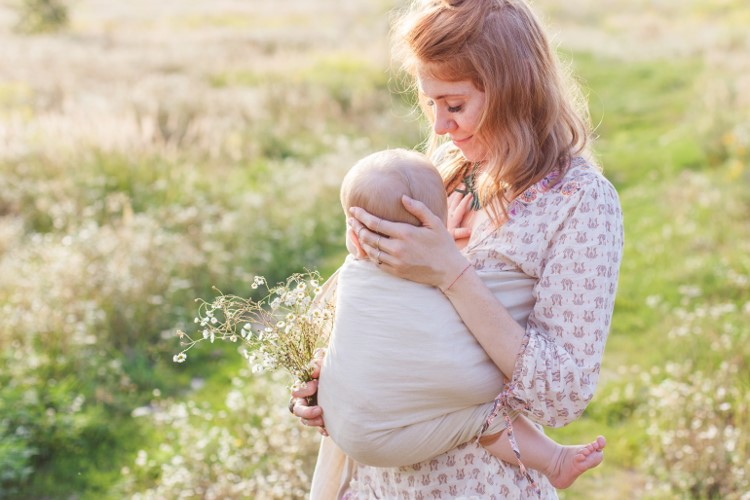
Dr Chantal Hofstee is a clinical psychologist, executive coach, mindfulness expert and mum of three little ones. She is also the author of Renew Your Mind and Reach Your Goals Without Stressing Out. Find out more at renewyourmind.co.nz.

AS FEATURED IN ISSUE 51 OF OHbaby! MAGAZINE. CHECK OUT OTHER ARTICLES IN THIS ISSUE BELOW
